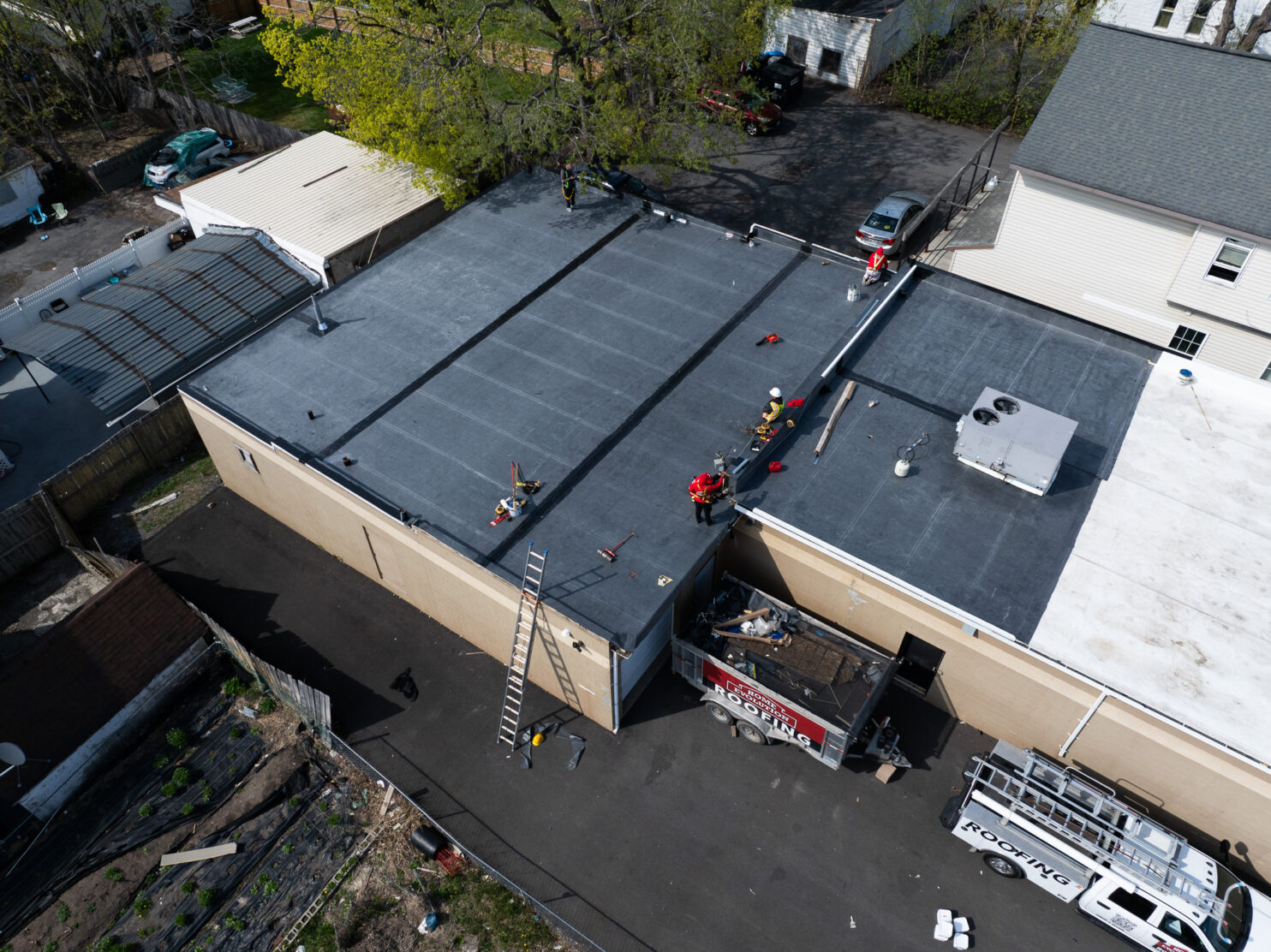Schenectady has long been a hub of industry and innovation in New York’s Capital Region. From factories that once powered the electric age to modern warehouses and distribution centers, the city’s buildings tell a story of progress. One thing they all share in common is the need for strong, dependable roofing.
For property owners—especially those managing industrial or commercial spaces—the roof is not just a cover over the building. It’s a shield against weather, a layer of protection for equipment, and an investment in long-term property value. At Home Evolution Roofing, we’ve helped Schenectady businesses and property owners make the right roofing choices, balancing durability, cost, and performance.
This article explores the unique considerations for commercial roofing in Schenectady, with practical advice and examples to help senior property owners or decision-makers feel confident in their options.
Why Commercial Roofing Matters in Schenectady
Weather Exposure
Schenectady’s winters bring heavy snow, while summers often include strong storms. Industrial buildings with flat or low-slope roofs need materials that can withstand ponding water, snow loads, and sudden temperature swings.
Protecting Assets
From machinery to inventory, a single roof leak can damage thousands of dollars’ worth of property. Proper roofing ensures that both your investment and your workforce are safe.
Long-Term Savings
Choosing the right commercial roofing system isn’t just about today’s cost—it’s about preventing costly repairs, lowering energy bills, and avoiding unplanned downtime.
Common Types of Commercial Roofing for Industrial Buildings
EPDM Roofing
EPDM (ethylene propylene diene monomer) is a synthetic rubber roofing membrane widely used for flat roofs. It’s durable, weather-resistant, and performs well under Schenectady’s seasonal changes.
-
-
-
Benefits: Affordable, flexible, and resistant to UV rays.
-
Example: A warehouse near Rotterdam Industrial Park used EPDM for its wide flat roof, ensuring long-term resilience against snow and rain pooling.
-
-
TPO Roofing
TPO (thermoplastic polyolefin) is another popular single-ply membrane. It’s energy-efficient and reflects sunlight, keeping buildings cooler in summer.
-
-
-
Benefits: Energy savings, strong seam bonding, and resistance to punctures.
-
Example: A manufacturing facility off Erie Boulevard installed TPO roofing to cut cooling costs while extending roof life.
-
-
Metal Roofing
Metal remains one of the strongest choices for industrial applications. It’s long-lasting, recyclable, and can be installed over existing roofing in many cases.
-
-
-
Benefits: Extremely durable, fire-resistant, and low maintenance.
-
Example: An industrial garage in Schenectady County upgraded to standing-seam metal roofing, avoiding the need for frequent patch repairs.
-
-
Modified Bitumen
Modified bitumen is a layered roofing system combining asphalt and reinforcing materials. It offers strength and weather resistance.
-
-
-
Benefits: Ideal for low-slope roofs, flexible in cold weather.
-
Example: A commercial bakery downtown used modified bitumen roofing for added protection against roof traffic and equipment installation.
-
-
Riverside and Industrial Zone Considerations
Schenectady’s riverside districts and older industrial zones require specific attention. Moisture from the Mohawk River can affect roofing systems, while older buildings often need reinforcement before new roofing is installed.
Flat roofs in these areas benefit from improved drainage systems, as standing water can quickly compromise roof integrity. Many industrial buildings now incorporate tapered insulation systems to direct water toward drains and prevent damage.
Energy Efficiency in Commercial Roofing
For large industrial properties, energy savings can be significant. A reflective TPO roof or insulated metal roof helps maintain indoor temperatures, reducing both heating and cooling costs.
Senior property owners overseeing industrial properties may find this especially important for long-term investments. A properly installed roof system reduces strain on HVAC equipment, helping keep operational costs steady over time.
Practical Maintenance Tips
Even the best roofing system requires maintenance. For commercial properties in Schenectady:
-
-
-
Schedule twice-yearly inspections, ideally in spring and fall.
-
Clear drains and gutters to prevent ponding water.
-
Watch for punctures or damage caused by roof traffic (common in industrial settings).
-
Keep records of repairs and inspections to simplify warranty claims.
-
-
Examples of Local Applications
-
-
-
Distribution Centers: Wide-span TPO roofs reduce cooling costs for large spaces.
-
Factories: EPDM provides reliable waterproofing and durability under heavy snow loads.
-
Auto Shops: Metal roofs withstand frequent heat exhaust and remain low-maintenance.
-
Food Production Facilities: Modified bitumen resists wear from equipment and roof foot traffic.
-
-
The Home Evolution Roofing Approach
We know that roofing decisions can feel overwhelming, especially for those managing older industrial properties in Schenectady. That’s why our process is built around clarity and trust.
-
-
-
Free Inspections: We assess roof condition with detailed reports.
-
Clear Options: We explain material choices without jargon, focusing on your needs.
-
Safety First: Our crews are trained to work safely on industrial and commercial sites.
-
Long-Term Value: Every system we recommend is chosen for durability and cost-effectiveness.
-
-
Conclusion
Commercial roofing in Schenectady, NY, demands careful planning. Between the city’s historic industrial buildings, riverside locations, and demanding weather, choosing the right roofing system can make all the difference.
Whether you’re considering EPDM, TPO, metal, or modified bitumen, Home Evolution Roofing is here to guide you. Our team specializes in industrial applications, helping property owners protect their investments while reducing long-term costs.
When it comes to your commercial property, peace of mind starts with a roof you can trust.

